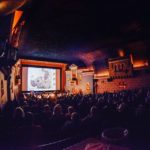As part of our upcoming Silence Is Golden Charlie Chaplin Film Fest, we are thrilled to incorporate a classic Felix the Cat cartoon scored by the SSO.
On November 9, 1919, Master Tom, a prototype of Felix, debuted in a Paramount Pictures short entitled Feline Follies. Produced by the New York City-based animation studio owned by Pat Sullivan, the cartoon was directed by cartoonist and animator Otto Messmer. It was a success, and the Sullivan studio quickly set to work on producing another film featuring Master Tom, the Felix the Cat prototype in Musical Mews (released November 16, 1919). It too proved to be successful with audiences. Otto Messmer claimed that John King of Paramount Magazine suggested the name “Felix”, after the Latin words felis (cat) and felix (happy). The name was first used for the third film starring the character, The Adventures of Felix (released on December 14, 1919). Pat Sullivan claimed he named Felix after Australia Felix from Australian history and literature. In 1924, animator Bill Nolan redesigned the character, making him both rounder and cuter. Felix’s new looks, coupled with Messmer’s character animation, brought Felix to fame.
The question of who created Felix remains a matter of dispute. Sullivan stated in numerous newspaper interviews that he created Felix and did the key drawings for the character. On a visit to Australia in 1925, Sullivan told The Argus newspaper that “[t]he idea was given to me by the sight of a cat which my wife brought to the studio one day”. On other occasions, he claimed that Felix had been inspired by Rudyard Kipling‘s “The Cat that Walked by Himself” or by his wife’s love for strays.Members of the Australian Cartoonist Association have claimed that lettering used in Feline Follies matches Sullivan’s handwriting and that Sullivan lettered within his drawings. Sullivan’s supporters also say the case is supported by his March 18, 1917, release of a cartoon short entitled The Tail of Thomas Kat more than two years prior to Feline Follies. Both an Australian ABC-TV documentary screened in 2004 and the curators of an exhibition at the State Library of New South Wales in 2005 suggested that Thomas Kat was a prototype or precursor of Felix. However, few details of Thomas have survived. His fur color has not been definitively established, and the surviving copyright synopsis for the short suggests significant differences between Thomas and the later Felix. For example, whereas the later Felix magically transforms his tail into tools and other objects, Thomas is a non-anthropomorphized cat who loses his tail in a fight with a rooster, never to recover it.
Sullivan was the studio proprietor and—as is the case with almost all film entrepreneurs—he owned the copyright to any creative work by his employees. In common with many animators at the time, Messmer was not credited. After Sullivan’s death in 1933, his estate in Australia took ownership of the character.
It was not until after Sullivan’s death that Sullivan staffers such as Hal Walker, Al Eugster, Gerry Geronimi, Rudy Zamora, George Cannata, and Sullivan’s own lawyer, Harry Kopp, credited Messmer with Felix’s creation. They claimed that Felix was based on an animated Charlie Chaplin that Messmer had animated for Sullivan’s studio earlier on. The down-and-out personality and movements of the cat in Feline Follies reflect key attributes of Chaplin’s, and, although blockier than the later Felix, the familiar black body is already there (Messmer found solid shapes easier to animate). Messmer himself recalled his version of the cat’s creation in an interview with animation historian John Canemaker:
Sullivan’s studio was very busy, and Paramount, they were falling behind their schedule and they needed one extra to fill in. And Sullivan, being very busy, said, “If you want to do it on the side, you can do any little thing to satisfy them.” So I figured a cat would be about the simplest. Make him all black, you know—you wouldn’t need to worry about outlines. And one gag after the other, you know? Cute. And they all got laughs. So Paramount liked it so they ordered a series.
Animation historians back Messmer’s claims. Among them are Michael Barrier, Jerry Beck, Colin and Timothy Cowles, Donald Crafton, David Gerstein, Milt Gray, Mark Kausler, Leonard Maltin, and Charles Solomon. No animation historians outside of Australia have argued on behalf of Sullivan.
Sullivan marketed the cat relentlessly while Messmer continued to produce a prodigious volume of Felix cartoons. Messmer did the animation directly on white paper with inkers tracing the drawings directly. The animators drew backgrounds onto pieces of celluloid, which were then laid atop the drawings to be photographed. Any perspective work had to be animated by hand, as the studio cameras were unable to perform pans or trucks. Pat Sullivan began a comic strip in 1923 distributed by King Features Syndicate. Messmer took over drawing duties of the strip. The first The Felix Annual from 1924 issued in Great Britain shows the last two stories are not the usual Otto Messmer style, so a difference in Pat Sullivan drawn cartoons can be noted.



